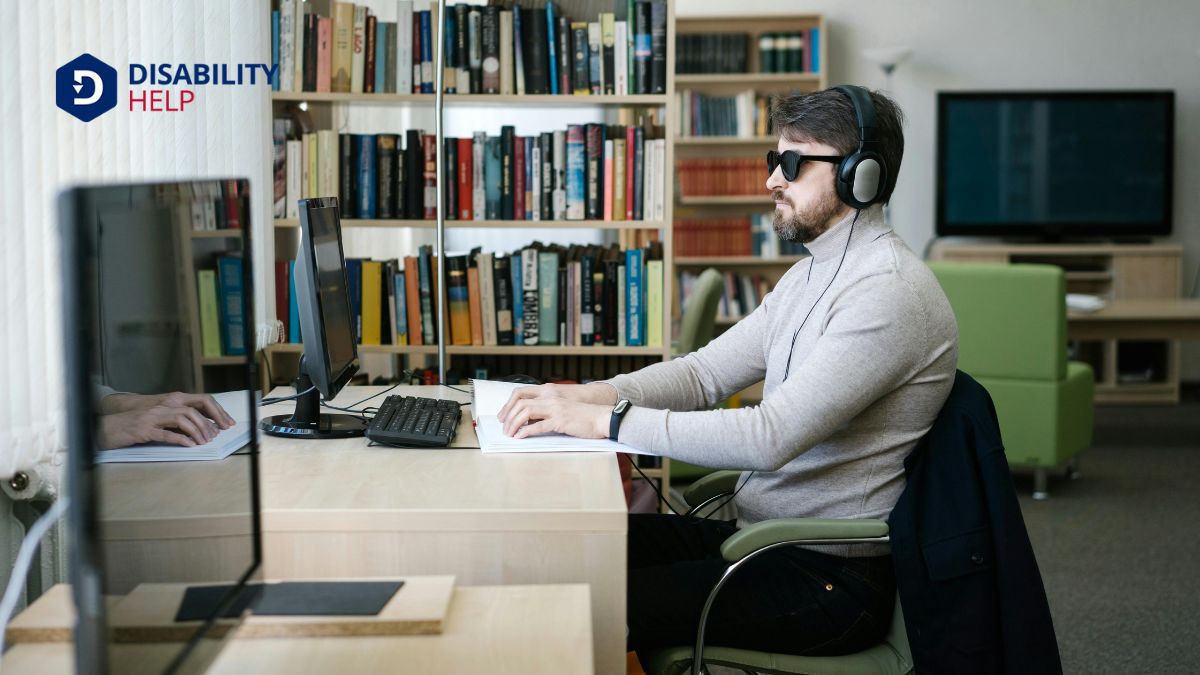Exploring learning disabilityA disorder in one or more of the basic processes involved in understanding or using language, spoken...disability rightsThe legal and human rights afforded to individuals with disabilities, often the focus of advocacy an... laws can be demanding, but by concentrating on these top 7 tips, we can empower ourselves and advocate more effectively. Let's prioritize our advocacyThe act of arguing in favor of, supporting, or defending the rights and interests of individuals or ... goals, comprehend our legal rights, and keep detailed records of all interactions. We should communicate assertively and always make decisions in writing to safeguard our rights. Building a strong support network and staying informed about any legal updates will also strengthen our efforts. By incorporating these strategies, we'll become more skilled at protecting and advancing our rights. There's much more to delve into regarding each of these tips for a thorough understanding.
Key Takeaways
- Regularly review and understand key legislation like the ADA and IDEA.
- Stay updated on state-specific disability rights laws and provisions.
- Utilize reputable resources such as Disability Rights Texas for legal guidance.
- Maintain detailed records of all communications and decisions regarding accommodationsModifications or adjustments in healthcare settings to support patients with disabilities..
- Join advocacy groups and attend workshops to stay informed about legal updates.
Prioritize Your Advocacy Goals
We often find that prioritizing our advocacy goals is important for effectively managing the complexities of learning disability rights laws. By focusing on specific areas where we need support or accommodations, we can make a significant impact.
For example, in education, guaranteeing that Sign Language interpreters are available to help those who need them can make a world of difference for students with disabilities.
When it comes to employment, we should prioritize championing reasonable accommodations that allow people with disabilities to perform their jobs effectively. Whether it's flexible working hours or assistive technology, identifying what we need most and pursuing those goals can lead to more meaningful and sustainable changes.
In housing, advocating for accessible living spaces can help ensure that people with disabilities have the same opportunities as everyone else. It's important to research and understand the specific legal frameworks, like the Americans with Disabilities Act (ADA)A U.S. law that prohibits discrimination against individuals with disabilities in all areas of publi... and the Individuals with Disabilities Education Act (IDEA), that protect our rights in these areas.
Let's remember to stay informed about updates and changes in these laws. By doing so, we can continue to advocate effectively for ourselves and others, making sure that the support we need is always available.
Understand Your Legal Rights

To understand our legal rights, we need to familiarize ourselves with laws like the ADA and IDEA. These laws protect us from discrimination and guarantee we receive necessary accommodations in education and the workplace. By knowing these legislations and accessing legal resources, we can advocate effectively for ourselves and understand the due processThe legal requirement that the state must respect all legal rights owed to a person, including fair ... involved.
Know Applicable Legislation
Comprehending your legal rights is vital for navigating the complexities of living with a learning disability. To effectively advocate for ourselves or others, we need to familiarize ourselves with key legislation like the Americans with Disabilities Act (ADA) and the Individuals with Disabilities Education Act (IDEA). These laws provide important protections in areas such as education, employment, housing, and public accommodations.
First, make sure we grasp the specific provisions of these laws. For instance, the ADA prohibits discrimination in the workplace and requires employers to provide reasonable accommodations. The IDEA ensures that students with disabilities receive a free and appropriate public education tailored to their individual needs.
Next, it's important to know the details of disability rights laws in our state. Each state may have additional protections or requirements, so we should review state-specific legislation to fully comprehend our rights.
Moreover, stay informed about any updates or changes to these laws. Policies evolve, and staying current helps us effectively advocate for our rights. Large print resources can be especially useful for those of us with visual impairments.
Access Legal Resources
Now that we're well-versed in the foundational laws safeguarding those with learning disabilities let's explore how to access the legal resources necessary to understand our rights fully.
To start, familiarizing ourselves with the Americans with Disabilities Act (ADA) and the Individuals with Disabilities Education Act (IDEA) is essential. These laws lay the groundwork, but we might require additional information to navigate specific situations.
Online tools, guides, and helplines offered by organizations like Disability Rights Texas can provide detailed legal information. These resources are invaluable for guaranteeing you understand your rights and the protections available.
If the complexities of the laws feel overwhelming, seeking advice from attorneys specializing in disability rights can make all the difference. They can help us navigate the intricate regulations.
It's also crucial to be aware of state-specific disability rights laws and protections. These can vary significantly and may offer additional safeguards.
To conclude, don't overlook free legal clinics and workshops. These events are excellent opportunities to learn more about our rights under disability laws without incurring high costs. By utilizing these resources, we'll be well-equipped to advocate for ourselves and ensure fair treatment.
Understand Due Process
Understanding due process is like having the key to accessing fair treatment under the law for individuals with learning disabilities. It guarantees we have the right to fair treatment by allowing us to appeal decisions, challenge discrimination, and seek legal redress. Knowing our due process rights helps us navigate legal procedures, protect our rights, and advocate effectively.
Due process secures access to essential services like education, housing, and guardianshipA legal relationship where a guardian is appointed to make decisions for an individual who is deemed.... By understanding these rights, we can guarantee that our needs are met and that we're treated fairly in various aspects of our lives.
For instance, if a school denies a child with learning disabilities the proper accommodations, knowing due process allows us to challenge that decision and seek the necessary support.
Empowering ourselves with knowledge about due process means we can assert our rights confidently. This understanding enables us to seek support, secure fair treatment, and navigate complex legal matters more effectively.
Let's remember: knowing our rights is the first step toward advocating for ourselves and others, ensuring everyone gets the fair treatment they deserve. By mastering due process, we open the door to justice and equal opportunities.
Maintain Detailed Records

While navigating our learning disability rights, maintaining detailed records of all related interactions and accommodations is vital. Keeping a thorough record ensures we've accurate documentation of dates, times, names of individuals involved, and specifics of each situation. This isn't just for our peace of mind; it's crucial for reference in case of disputes or challenges.
Let's break down what this involves. We should document any denials of accommodations, instances of discrimination, or violations of our rights. Each entry should be specific, noting the who, what, when, and where of the incident.
For example, if an accommodationAdjustments or modifications provided to individuals with disabilities to ensure equal access and pa... is denied, jot down the date, the person who denied it, and the reason given.
Organization is key. Using a designated folder, planner, or digital system helps keep these records secure and easily accessible. These records aren't just for personal reference; they're invaluable when advocating for ourselves or seeking legal assistance.
Communicate Assertively
Now, let's talk about how to communicate assertively when advocating for learning disability rights.
We need to use clear and direct language to express our needs and rights while also practicing active listening to guarantee our message is understood.
Clear and Direct Communication
When advocating for disability rights laws, it's crucial to clearly state our needs and rights through assertive communication. Being direct and specific helps convey our concerns and expectations effectively. By avoiding unclear language, we make our requests more actionable and easier to fulfill.
To communicate assertively and clearly, we can focus on a few key strategies:
- Be Specific: Clearly outline the accommodations and support we require. This helps prevent misunderstandings and guarantees we receive the precise assistance we need.
- Stay Confident: Confidence in expressing our rights and needs reinforces the significance of our requests. It shows our awareness of what we deserve and our unwillingness to settle for less.
- Clarify When Needed: Don't hesitate to ask for clarification if something is unclear. This ensures mutual understanding and maintains a productive conversation.
- Use "I" Statements: Frame our needs using statements like "I need" or "I require" to personalize our communication and make it more relatable.
Active Listening Techniques
Effective communication hinges not only on how we express ourselves but also on how well we listen. Active listening involves fully concentrating on what the speaker says without interrupting. By doing this, we show that we value their words and viewpoints.
When engaging in discussions, we should demonstrate empathyThe ability to understand and share the feelings of another, particularly important in understanding... and understanding by paraphrasing, summarizing, and asking clarifying questions. This guarantees that we grasp the essence of what's being said and that the speaker feels heard.
Non-verbal cues play an essential role in active listening. Nodding and maintaining eye contact can encourage open communication and show the speaker that we're genuinely interested. Reflective listening, where we restate what we've heard, can confirm our understanding and validate the speaker's feelings and perspectives.
Using these techniques not only improves our relationships but also builds trust and helps in resolving conflicts. When we actively listen, we pave the way for clearer communication, which is crucial in understanding and advocating for learning disability rights laws.
Let's remember that effective listening is just as essential as clear speaking in our efforts to foster inclusive and supportive environments.
Obtain Decisions in Writing

Obtaining decisions in writing is significant for anyone exploring learning disability rights laws. When we confirm we have a clear record of agreements and actions, we protect our rights and have a reference point in case of any disputes or misunderstandings. Written decisions serve as essential evidence of legal processes and can bolster our advocacy efforts.
Requesting decisions in writing is a standard practice that promotes transparency and accountability. It helps us track progress, understand implications, and provide a basis for further actions if needed. Here are some key reasons why obtaining written decisions is crucial:
- Clear Record: Written decisions provide a clear, tangible record of what was agreed upon, preventing any ambiguity.
- Protection of Rights: Having decisions in writing helps safeguard our rights, ensuring we've proof of what was discussed and decided.
- Evidence and Advocacy: Written documents can be instrumental in supporting our case during advocacy efforts or legal disputes.
- Transparency and Accountability: This practice ensures all parties are held accountable, promoting honesty and clarity in legal matters.
Build a Support Network
While obtaining decisions in writing provides us with a solid foundation, building a support network is equally important. Connecting with local advocacy groups and support organizations can offer invaluable resources and guidance. By attending workshops, seminars, and online forums, we can stay informed about the latest resources, legal protections, and advocacy strategies.
Joining support groups for individuals with learning disabilities allows us to share experiences and gain insights from others facing similar challenges. This collective wisdom can be empowering. It's also pivotal to seek guidance from professionals, educators, and legal experts. Their specialized knowledge in learning disability rights laws can provide personalized assistance that's tailored to our unique situations.
Collaborating with like-minded individuals, educators, and advocates helps us stay informed and empowered. Together, we can actively promote disability rights awareness and make meaningful strides in the community. Building a strong support network isn't just about getting help; it's about creating a web of connections that fosters mutual growth and support.
This network can be a cornerstone in our journey, providing the strength and knowledge needed to navigate the complexities of learning disability rights laws. Let's commit to building these essential connections.
Stay Informed and Updated
Keeping ourselves informed and updated is important in navigating the landscape of learning disability rights laws. To effectively advocate for and support those with learning disabilities, we need to guarantee we're always aware of the latest legal developments and best practices. Here's how we can stay on top of this ever-evolving field:
- Regularly review federal laws: Make a habit of checking updates to the Individuals with Disabilities Education Act (IDEA) and the Americans with Disabilities Act (ADA). Changes in these laws can significantly impact rights and services.
- Stay informed about state-specific laws: Each state has its own regulations and policies regarding disability rights. Familiarize ourselves with these local laws to understand how they might affect individuals with learning disabilities in our area.
- Follow reputable organizations: Organizations like the National Center for Learning Disabilities and the Disability Rights Education & Defense Fund frequently provide updates and resources. By following these groups, we can access accurate, up-to-date information.
- Attend workshops and webinars: Participating in educational events can enhance our knowledge and keep us informed about new developments. These sessions often provide practical insights and networking opportunities.
Frequently Asked Questions
What Are the 7 Specific Learning Disabilities?
We should recognize the seven specific learning disabilities: dyslexiaA learning disorder characterized by difficulty reading due to problems identifying speech sounds an..., dyscalculia, dysgraphia, auditory processing disorder, visual processing disorder, non-verbal learning disabilities, and ADHDAttention Deficit Hyperactivity Disorder, characterized by inattention, hyperactivity, and impulsivi.... Understanding these helps us tailor interventions and support for those affected.
What Are the 4 Fundamental Rights for People With Disabilities?
We need to know the four basic rights of people with disabilities: protection from discrimination, equal accessThe principle that all individuals, including those with disabilities, should have equal opportunity... to services and programs, reasonable accommodations in public places, and the right to education. Let's make sure we grasp and assert these rights.
What Are the 8 Areas of Specific Learning Disability?
We need to know the eight areas of specific learning disability: oral expression, listening comprehension, written expression, basic reading skills, reading fluency, reading comprehension, mathematics calculation, and mathematics problem-solving. Understanding these helps us support individuals effectively.
What Are the Strategies of the Disability Rights Movement?
We fight for disability rights through legal action, advocacy campaigns, protests, and policy changes. We challenge discrimination, promote accessibilityThe design of products, devices, services, or environments to be usable by people with disabilities...., and empower self-advocacyThe act of representing oneself and one’s interests, particularly by individuals with disabilities... by raising awareness, educating the public, and lobbyingThe act of attempting to influence the decisions of government officials, often used by disability a... for legislative changes.
Conclusion
Let's remember understanding disability rights laws isn't just about knowledge—it's about empowering ourselves and others. By prioritizing advocacy goals, knowing our legal rights, keeping detailed records, communicating assertively, getting decisions in writing, building a support network, and staying updated, we're setting ourselves up for success. Together, we can better navigate the complexities of these laws and secure fair treatment for everyone. Remember, we're all in this together, and our collective efforts make a difference.






